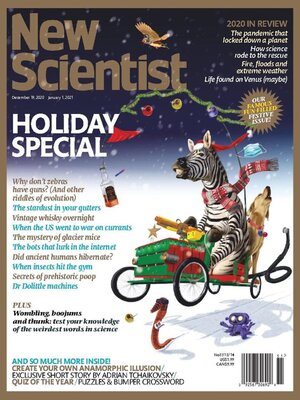New Scientist
magazine ∣ Dec 22 2020 · New Scientist

Sign up to save your library
With an OverDrive account, you can save your favorite libraries for at-a-glance information about availability. Find out more about OverDrive accounts.
Find this title in Libby, the library reading app by OverDrive.



Search for a digital library with this title
Title found at these libraries:
| Loading... |
New Scientist covers the latest developments in science and technology that will impact your world. New Scientist employs and commissions the best writers in their fields from all over the world. Our editorial team provide cutting-edge news, award-winning features and reports, written in concise and clear language that puts discoveries and advances in the context of everyday life today and in the future.
Elsewhere on New Scientist
Brighter prospects • As 2020 draws to an end, vaccines give us a shot at returning to normality
New Scientist
Vaccination begins in the US • The mammoth logistical task of mass vaccination against covid-19 is under way in the US and Canada, reports Michael Le Page
How the US can beat the virus • What can incoming US president Joe Biden do to stop the surge of coronavirus cases across the country? Cassandra Willyard reports
Will vaccine immunity last? • The latest results offer cautious optimism that vaccines will give us the kind of immunity we need to end the pandemic, reports Graham Lawton
Corralling wild horses in the US • Should birth control replace round-ups to control wild horse populations?
Ancient humans may have hibernated during glacial winters
The magnetic fields at the start of the universe
The original dollar • Ancient shell beads may have been the first money used in the Americas
Tasmanian devils with cancer may shun others
Human-made stuff outweighing nature
Dog bots find their feet with AI’s help
Really brief
Bees gather dung to fend off killer hornet
Vast gas balloons may have been created by black hole
New clues in hunt for pterosaurs’ ancestor
Goodbye to 2020 • As one of the most extraordinary years of modern times draws to a close, New Scientist looks back at the ongoing coronavirus pandemic, the possibility of life on Venus and more
How we got to know a new enemy • In an extraordinary year for science, research into covid-19 has shed a bright light on the unknown, reports Graham Lawton
A year that shook the world • Clare Wilson recaps how a handful of infections in China led to a global pandemic
Vaccines made in record time
The world ground to halt
The countries that tamed covid-19 • A handful of nations have achieved something thought almost impossible, reports Michael Le Page
SpaceX makes history with crewed flight
A sign of progress for nuclear fusion • Efforts to develop a clean source of power advanced despite the coronavirus pandemic
Life on Venus? We’re still looking • Clara Sousa-Silva spent much of the year sitting on a huge secret. She spoke to Leah Crane about how it felt
A time for universal basic income? • Once a fringe prospect, the idea of paying everyone regular sums is growing in popularity
When Earth acquired a new moon • An object about the size of a car was briefly spotted in orbit around our planet
A whirlwind of extreme weather • While our attention was elsewhere, the global climate crisis continued, says Adam Vaughan
Computers party like it’s 1920 • The Y2K bug made an unexpected comeback after a lazy fix backfired 20 years later
Tech titan tussles • Global technology firms dominate our lives, but 2020 saw governments try to claw back power, says Donna Lu
See it from the beetle’s point of view
Tree-planting ambitions yet to take root • Talk of reforestation to combat climate change hasn’t been matched by action
An extraordinary year • As 2020 draws to a close, New Scientist’s columnists reflect on what’s important for them, from race justice to plant power, family to hope for the future
Your letters
Two’s company
Difficult Times...






